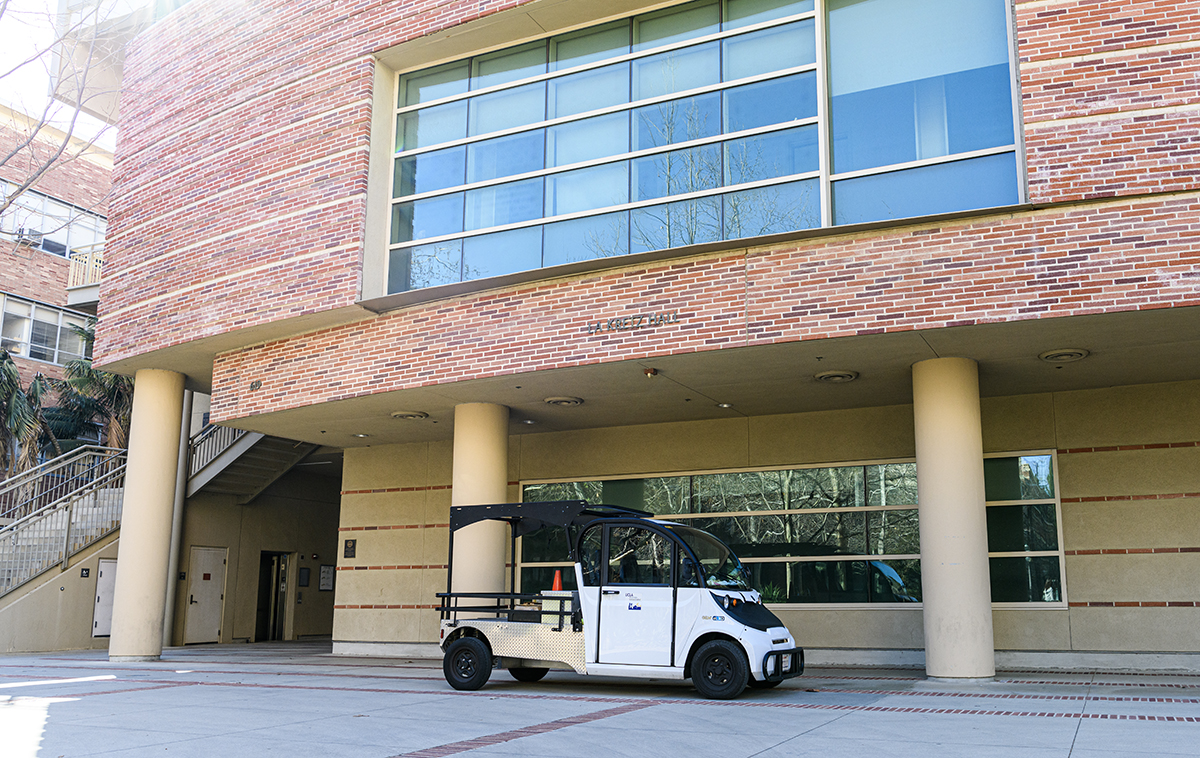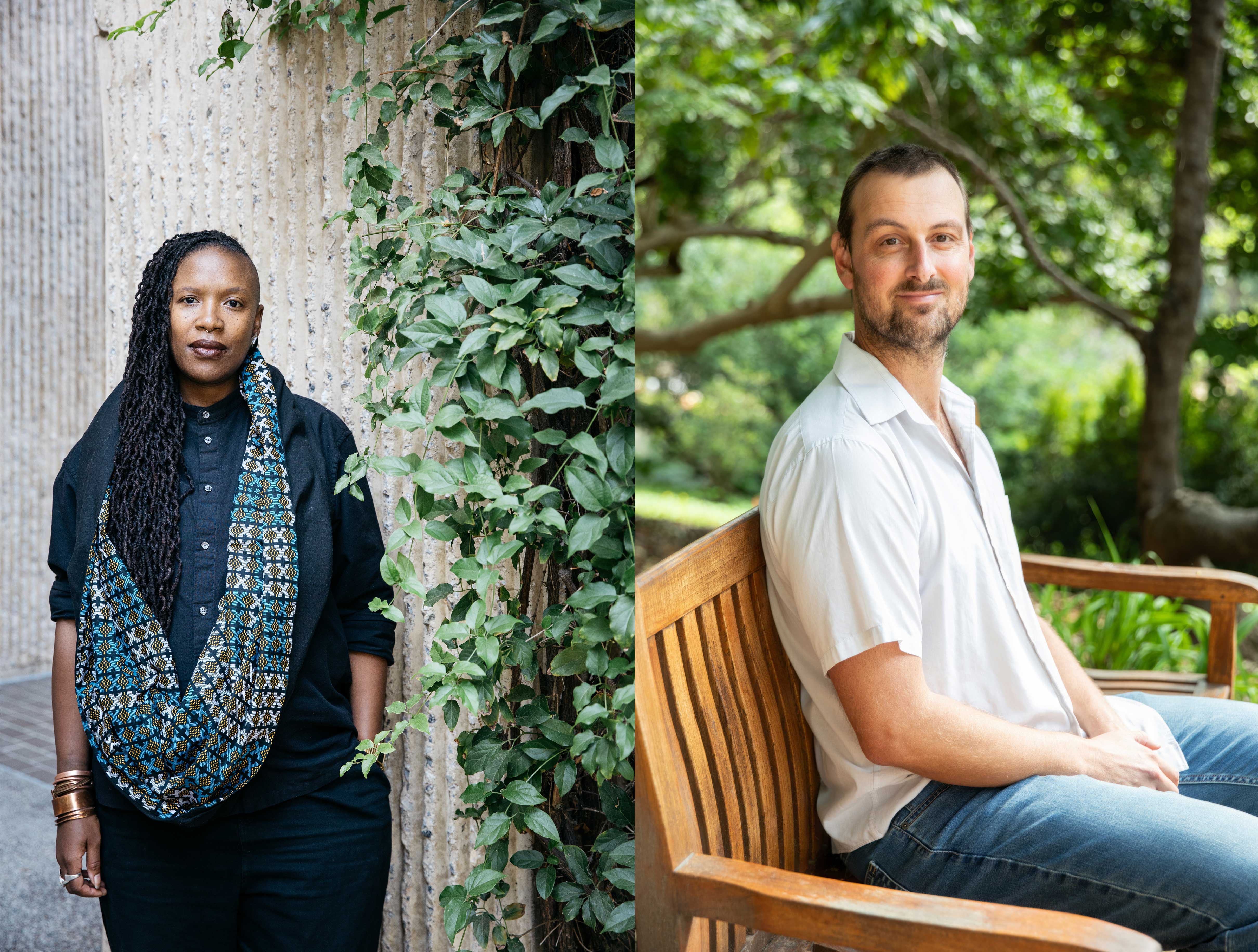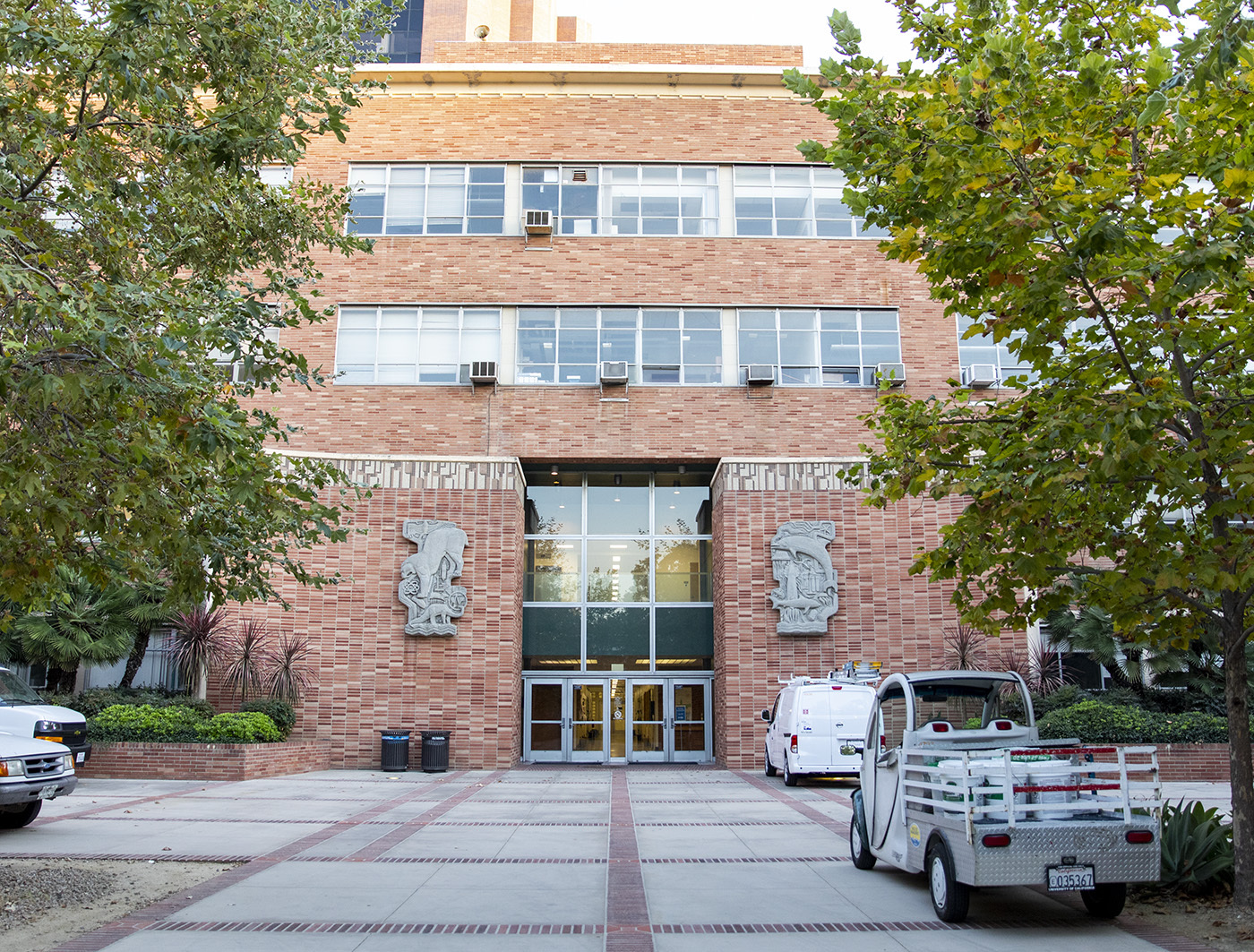Q&A: Iroro Tanshi discusses recently awarded conservation work, research plans

La Kretz Hall, which houses the UCLA Institute of the Environment and Sustainability, is pictured. The Daily Bruin sat down with the Institute’s 2023 Pritzker Emerging Environmental Genius Award winner, Iroro Tanshi, to discuss her research in bat conservation and plans for the future. (Joseph Jimenez/Photo editor)
By Lex Wang
Nov. 22, 2023 5:58 p.m.
Iroro Tanshi, winner of the UCLA Institute of the Environment and Sustainability’s 2023 Pritzker Emerging Environmental Genius Award, sat down with the Daily Bruin to discuss her award-winning work and plans for future research.
Tanshi, a postdoctoral researcher at the University of Washington whose work centers on bat conservation, will receive $100,000 in prize money as part of a 2013 gift from the Anthony and Jeanne Pritzker Family Foundation. The award is given annually to one individual who has demonstrated the ability to tackle environmental issues through fields such as science, business or arts, according to the IoES website.
This interview has been edited for length and clarity.
Daily Bruin: Tell me a bit about yourself. What research do you conduct?
Iroro Tanshi: I am a postdoc at the University of Washington, but I also founded an NGO (nongovernmental organization) called Small Mammal Conservation Organization, registered in Nigeria. What we do in Nigeria is study bat habitats and how bats are using those habitats and protect those habitats for bats, especially for endangered species. First of all, I do all the critical research and then start to move that research to decision-making. So it’s actionable science, more or less. There are parts of it that are more on the academic side, but we do bring in this, “How are we going to stop this biodiversity loss?” – starting with bats.
There’s a whole suite of the protection program that really looks at everything from the forest habitats, the cave habitats or the humans in that environment – it’s a complement of things that we do. It’s really quite involved in that sense, because it’s not restricted to Nigeria. There is a species that we primarily protect, what’s called the short-tailed roundleaf bat. It’s known from just three countries: Nigeria, Cameroon and Equatorial Guinea. We’ve been trying to protect the species in Nigeria, but we’re now coming to the painful acceptance that we can’t just stick only in Nigeria. This is one of those species that you cannot assume that, because it’s in a protected area, it’s fine. It’s a very demanding species to protect, but it makes it more exciting because that means you get to be in the forest all the time, trying to figure out what’s going on.
DB: How did you become interested in this research?
IT: I attended a few courses in Uganda in 2010. During that field course, there was a professor from Sweden who was describing his Ph.D. students’ fieldwork in Côte d’Ivoire. That fieldwork just utterly blew my mind. Every time I tell the story, I still feel the goosebumps of just listening to that talk. He was basically saying that Ph.D. students would go up into the forest canopy and record scents of flowers that are visited by bats. Sometimes, he would be in the forest canopy for three nights at a time – he would not come down from the trees. I was like, “Yeah, sign me up. This is what I want to do for the rest of my life.” I was struggling to find an interesting master’s project to do. I’ve got a very adventurous spirit, and I’ve always looked forward to fieldwork as the opportunity to explore that. As soon as this (idea) presented itself, I was completely bought.
As soon as I got back to Nigeria from that field course, it was very obvious that there was almost no active bat research going on in the country at the time. In the city where I lived, there was a big bat colony in the city center. Somehow I just managed to not pay them attention, but as soon as I got back from this field course, I was like, “I am going to the city center.” That’s how I got in. It was a mix of all these things: getting told about this exciting research, needing to find a master’s program project and no one really doing stuff in the country on this activity at the time.
DB: How did you feel when you heard that you won the award?
IT: I got nominated by someone who was also nominating somebody else. They didn’t know they could only nominate one person. During the first round of screening, I got told that the person who nominated me preferred to stick with the other person that he nominated, and so I was going to get dropped out of the program. Somebody else – some kind person who had been a nominee before – decided they would nominate me, so that’s how I managed to stay on board. I could really have lost out on this, so I’m very grateful to even be here at all.
It’s funny because you have to wait until this one second in the evening when you know. Until that time, you just hedge your bets. All of these other people do such amazing stuff. In fact, I really liked (that) during the event, they put up all the nominees who didn’t make it through to the finalists. Those are really good people doing really hard work across the world, so it could really have been anybody. I just kept trying to say to myself, “Nature would win, so if I don’t win, it’s okay.” I would have had an all-expenses-paid flight to LA for the first time, to UCLA for the first time. I met a lot of wonderful people.
When my name got mentioned as the winner, that moment was surreal. It felt earth-shattering, because suddenly you realize all the months of waiting have come to this moment, and it’s you. Few moments in my life have felt that way.
DB: What do you anticipate using the new funds for?
IT: Ultimately, the goal is to be able to scale up this program – this fire prevention program – across the entire forest block from southeastern Benin Republic through southwestern Cameroon. We’re not going to be able to achieve that ultimate goal with this amount of money, but what we’re going to do is move to the biggest remaining patch in southern Nigeria. This is Nigeria’s biggest remaining forest – everywhere else in Nigeria is protected. That forest is heavily plagued by fires, and a lot of it is agriculture, but a lot of it is also fires that are a byproduct of agricultural practices in the region. The next immediate step is to expand it there and consolidate some of the work that we’re already doing.
DB: Anything else you’d like to add?
IT: When I say we’re doing something right, it’s not just a matter of just being out there. If you really want to be effective, it’s something that has to be carefully thought out, carefully planned. Every environmental problem requires its match in response.
For me, that’s kind of what we’re trying to do with our species. The species require a lot of work with local communities. There are many things to consider. Suddenly you go from, “I just want to protect this tiny bat that’s about the size of a golf ball,” to, “Oh, I also have to think about a community.” You need to listen and translate that lesson that you learned from communities so that it benefits both nature and people. That way, you don’t leave people behind.






